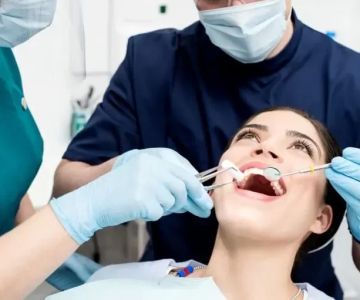Dental Trauma: An Overview
Dental trauma refers to any injury that occurs to the teeth, gums, jawbone, or soft tissues of the mouth. Accidents, such as falls, sports-related incidents, and vehicle crashes, are common causes of dental trauma. The severity of dental trauma can range from minor chipped teeth to more serious conditions like knocked-out teeth or broken jaws.
Symptoms and Causes of Dental Trauma
The symptoms of dental trauma vary depending on the type and extent of the injury. Common symptoms include toothache, discolored teeth, mouth pain, swelling, bleeding from the mouth, changes in the way teeth fit together when biting, loose teeth, and difficulty moving the jaw or opening the mouth. The main causes of dental trauma include falls, vehicle accidents, sports injuries, physical altercations, and certain risky behaviors like playing contact sports without proper protective gear, having an overjet, extensive tooth decay, lip and tongue piercings, or being under the age of 20.
Diagnosis and Tests for Dental Trauma
A dentist will conduct a thorough examination of your mouth to diagnose dental trauma. They will inquire about how the injury occurred and the symptoms you are experiencing. Dental X-rays or a CT scan may also be performed to assess the extent of the damage.
Management and Treatment Options
Dentists employ various procedures to treat dental trauma, depending on the nature and severity of the injury. Common treatments include dental fillings and bonding to repair minor chips and cracks, root canal therapy for fractures reaching the tooth pulp, restabilization or replantation of dislodged or knocked-out teeth, tooth extraction for severely damaged teeth, and tooth replacement for lost teeth. Dental bridges and dental implants are common replacement options.
Prevention of Dental Trauma
Although it's not always possible to prevent dental trauma completely, there are steps you can take to reduce the risk. Wearing a protective mouthguard during contact sports, wearing a seatbelt while driving or riding in a vehicle, avoiding chewing on ice or using your teeth as tools, and refraining from biting your fingernails can all help lower the chances of sustaining a dental injury.
Outlook and Prognosis
Each dental trauma case is unique, but in general, prompt treatment offers a better prognosis. The healing time depends on the type of injury. Minor traumas, like soft tissue injuries, may heal within a week, while tooth trauma typically takes about four to six weeks to heal, unless the damage reaches the tooth pulp, in which case a full recovery could take several months.
Living With Dental Trauma
It's essential to call your dentist immediately if you have a dental injury, even if you're not in pain. Untreated dental trauma can lead to serious oral health issues like cavities and infections. In cases of excessive bleeding that won't stop, severe pain not relieved by medication, or a broken jaw or other broken facial bones, visiting the emergency room is necessary.
Common Questions to Ask Your Dentist
If you've experienced dental trauma, it's advisable to ask your dentist questions such as how serious the injury is, what treatment is needed, how long the treatment will take, the success rate of the treatment, and whether they'll be able to save your tooth.
Additional Information and References
Dental trauma is a significant concern that can have various effects on oral health. It's crucial to seek prompt medical attention to minimize potential complications and ensure the best possible outcome. For more detailed and accurate information, you can refer to reliable sources such as the ones mentioned in the references section.
Dental trauma is a complex issue that requires prompt attention and appropriate treatment. By understanding the causes, symptoms, treatment options, and prevention measures, you can better deal with such situations and safeguard your oral health. Early intervention and proper care are key to a successful recovery and maintaining a healthy smile.



 Westgate Dental Arts
Westgate Dental Arts Coventry Family Dental
Coventry Family Dental Familia Dental
Familia Dental Dr. Daniel S. Fife, DDS
Dr. Daniel S. Fife, DDS Dentistry At Suburban Square: Michael I. Wollock, DMD
Dentistry At Suburban Square: Michael I. Wollock, DMD Comfort Care Dental
Comfort Care Dental The Importance of Oral Health Education During Pregnancy for a Healthy Pregnancy
The Importance of Oral Health Education During Pregnancy for a Healthy Pregnancy Why Skipping Dental Checkups Can Lead to Bigger Oral Health Problems
Why Skipping Dental Checkups Can Lead to Bigger Oral Health Problems Best Tips for Brushing Your Teeth Properly for Healthy Gums: Essential Techniques for Oral Health
Best Tips for Brushing Your Teeth Properly for Healthy Gums: Essential Techniques for Oral Health Advantages of Porcelain Dental Restorations
Advantages of Porcelain Dental Restorations How Can Diabetes Cause Tooth and Gum Problems? Preventing and Managing Oral Health Issues
How Can Diabetes Cause Tooth and Gum Problems? Preventing and Managing Oral Health Issues Healthy Habits for Promoting Good Oral Health and Hygiene: Tips for a Healthy Smile
Healthy Habits for Promoting Good Oral Health and Hygiene: Tips for a Healthy Smile